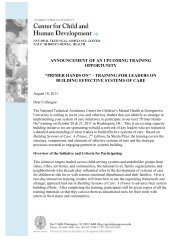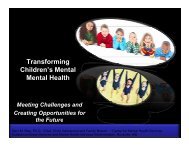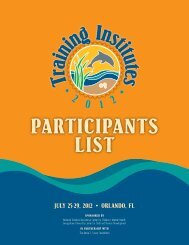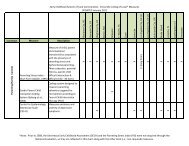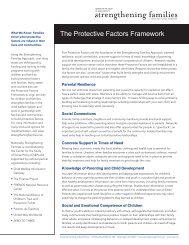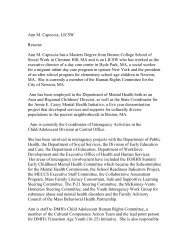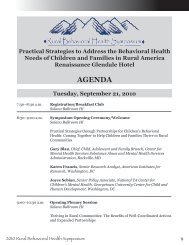Training Institutes 2012 - National Technical Assistance Center for ...
Training Institutes 2012 - National Technical Assistance Center for ...
Training Institutes 2012 - National Technical Assistance Center for ...
You also want an ePaper? Increase the reach of your titles
YUMPU automatically turns print PDFs into web optimized ePapers that Google loves.
intertwines them with an innovation. To date, the model has been implemented in more than 60 churches in five states,<br />
with memberships ranging from 60 to 30,000.<br />
Specific topics to be covered include:<br />
• A review of outcomes <strong>for</strong> youth exiting foster care based on a study that surveyed over 700 youth in four waves of<br />
data collection beginning at age 17 through 23-24 years of age<br />
• How to engage the faith community and create partnerships among faith communities, transition organizations,<br />
clinical psychologists, government, local businesses, and nonprofit organizations<br />
• How to implement highly individualized planning in the faith-based context using a group of volunteers who make a<br />
year commitment to act as life specialists, encouragers, and advocates<br />
• How Table members, together with the individual or family, establish goals and develop and implement an<br />
individualized plan that draws upon resources in their congregations and communities such as legal, accounting,<br />
behavioral health, dentistry, employment, and transportation<br />
• How the model draws on experience and research on high-fidelity wraparound by implementing a process that is<br />
strength-based; provides the individuals with voice, choice, and access; engages natural supports; is highly<br />
individualized; and is sustainable<br />
A video illustrating the Open Table process will be shown, and small groups will be asked to provide their ideas on how<br />
the model could impact practice in their communities. The faculty includes the perspectives of agency administrators,<br />
national experts on financing, youth, and direct service staff.<br />
MODERATOR/PRESENTER: Gail Biro, M.S.W., <strong>National</strong> Director of Quality Assurance and Quality Improvement,<br />
Arrow Child & Family Ministries, Spring, TX<br />
Jon Katov, Founder, Open Table, Phoenix, AZ<br />
John VanDenBerg, Ph.D., President, Vroon VanDenBerg, LLP, Paonia, CO<br />
WORKSHOP #8 3:30 PM THURSDAY • 8:30 AM SATURDAY • NAPLES 1<br />
Innovative Financing Strategies <strong>for</strong> Systems of Care:<br />
Creating a County Children’s Service Fund<br />
OBJECTIVES—Participants will learn:<br />
1. How to finance children’s mental health services through a successful grassroots campaign<br />
2. To describe a social investment approach that incorporates a robust theory of change and implementation of high<br />
standards of quality to ensure that resources are used wisely, effectively, and efficiently<br />
3. How to apply practical and innovative strategies <strong>for</strong> training, data system, and communication strategies to ensure<br />
return on investment in the creation and maintenance of a system of care approach<br />
This Workshop will focus on the creation of a children’s services fund to finance children’s mental health services in a<br />
county. The strategies to be highlighted are based on the experience of St. Louis County, Missouri. Like many<br />
communities, St. Louis County experienced significant reductions in funding <strong>for</strong> children’s mental health services due<br />
to budget cuts. To address the growing need, a grassroots ef<strong>for</strong>t was launched to create a community children’s services<br />
fund that has provided $38 million annually solely <strong>for</strong> children’s mental health and substance use services.<br />
The county leveraged existing Missouri State Statutes that allow local communities to create a community children’s<br />
service fund, but the broad strategies used to create the fund are applicable in states and communities that may not have<br />
similar statues, such as a petition drive and awareness campaign. Faculty will share advocacy ef<strong>for</strong>ts that can be used to<br />
secure funding, as well as communication, training, and per<strong>for</strong>mance improvement strategies to successfully sustain<br />
children’s mental health services.<br />
Specific topics to be covered include:<br />
• Creating financing mechanisms to support the infrastructure and services of a system of care approach<br />
• Utilizing high quality standards <strong>for</strong> accountability and quality improvement, Malcolm Baldrige Criteria <strong>for</strong><br />
Per<strong>for</strong>mance Excellence<br />
<strong>Training</strong> <strong>Institutes</strong> <strong>2012</strong><br />
WORKSHOPS<br />
69



